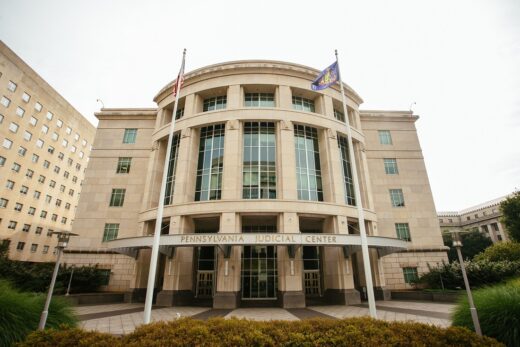Spotlight PA is an independent, nonpartisan newsroom powered by The Philadelphia Inquirer in partnership with PennLive/The Patriot-News, TribLIVE/Pittsburgh Tribune-Review, and WITF Public Media. Sign up for our free newsletters.
By Katie Meyer | Spotlight PA

Credit: Kent M. Wilhelm/Spotlight PA
Establishment candidates had a good night in primaries for Pennsylvania’s three appellate benches, setting up what could be contentious, well-funded races to fill seats on the state Supreme, Superior, and Commonwealth Courts this November.
The race for an open seat on Pennsylvania’s highest court will pit Democrats’ chosen candidate, Philadelphia’s Daniel McCaffery, against Republican favorite Carolyn Carluccio of Montgomery County.
The Associated Press called the race for McCaffery around 9:30 p.m. and for Carluccio around 11:30 p.m. Tuesday. The AP’s election analysts call races when a “trailing candidate no longer has a path to victory.”
In the lower appellate court races, Philadelphia Democrat Matt Wolf will run against Cumberland County Republican Megan Martin in the Nov. 7 general election for a seat on Commonwealth Court, which handles cases involving local governments, Pennsylvania agencies, and the state itself.
And Democrats Jill Beck of Allegheny County and Timika Lane of Philadelphia will go up against Republicans Maria Battista of Clarion County and Harry Smail of Westmoreland County for two seats on Superior Court, which handles civil cases not related to governments, as well as criminal cases.
The eventual winners of these races will have a major impact on politics and policy in Pennsylvania.
In recent years, justices on Commonwealth and Supreme Courts have made decisions that reshaped congressional maps, determined which mail ballots should be counted, and found the state’s school funding system unconstitutionally unfair. The Superior Court has also gotten national attention in recent years for some of its rulings, like a decision to vacate a conviction against rapper Meek Mill in 2019.
The November election could change the balance of partisan power on the Superior Court, and could get Republicans a step closer to their almost decade-old goal of reclaiming a Supreme Court majority.
Pennsylvania Supreme Court
In the Democratic primary for a single open seat on the Pennsylvania Supreme Court, two Superior Court judges competed for their party’s nomination. McCaffery, who had the party’s endorsement and was well-funded by the commonwealth’s major labor unions, beat Beaver County’s Deborah Kunselman.
The Republican primary for the open seat pitted Carluccio, a Montgomery County Court of Common Pleas judge, against Patricia McCullough, a Commonwealth Court judge who also ran unsuccessfully for a Supreme Court seat in 2021. Carluccio worked as an assistant U.S. attorney in Delaware, then as chief public defender of Montgomery County.
The seven-member state Supreme Court, which serves as Pennsylvania’s court of last resort, has one seat open after the death last year of former Chief Justice Max Baer.
Currently, the court is divided between four Democrats and two Republicans. While Republicans can’t win back a majority in this year’s November election, a win would bring them closer to recapturing it for the first time since 2015.
Both candidates in the Democratic primary were rated “highly recommended” by the Pennsylvania Bar Association, which ranks justices based on their experience, reputation as jurists, and answers to detailed questionnaires.
In their relatively low-key race, Kunselman won the endorsement of The Inquirer, which noted she had served on the Superior Court longer than McCaffery. The editorial board called McCaffery “enmeshed in party politics.”
Before joining Superior Court in 2019, McCaffery was a Philadelphia assistant district attorney and a judge on the city’s Common Pleas Court. His brother Seamus McCaffery is a former state Supreme Court justice who retired after exchanging explicit emails with at least one government employee.
Daniel McCaffery collected endorsements from Pennsylvania’s Professional Fire Fighters Association, Teamsters, and the state Building & Construction Trades Council. In the most recent filing period, which ran from late March to the beginning of May, McCaffery’s campaign spent nearly $300,000 while Kunselman’s campaign spent less than $28,000.
The GOP primary was even more financially lopsided.
Carluccio’s campaign spent more than $250,000 in the most recent filing period. McCullough’s campaign spent less than $1,000 and had less than $20,000 on hand. Outside spending was also a factor — the national Republican State Leadership Committee put $500,000 into advertisements supporting Carluccio’s campaign.
McCullough, a Commonwealth Court judge from Allegheny County, is notable for being one of the only judges in Pennsylvania to rule in favor of Donald Trump’s attempts to delay certification of the 2020 election.
In March, she attended a political rally hosted by state Sen. Doug Mastriano (R., Franklin) at which she called Pennsylvania “the birthplace of the ‘One Nation Under God” and spoke alongside Trump lawyer Christina Bobb, who spread false claims of election fraud.
Though Carluccio has been much less involved in election politics, she has criticized the state’s mail voting law. According to The Inquirer, Carluccio recently told Erie County Republicans that Act 77 should be reworked and is “bad for the commonwealth.” Asked whether the 2020 and 2022 elections were free and fair, she did not answer directly.
The state bar association rated Carluccio “highly recommended.” It rated McCullough “not recommended,” as she did not participate in the process.
Superior Court
The Democratic primary for Superior Court saw Beck and Lane beat out Philadelphia’s Patrick Dugan for two open seats. The Republican primary, meanwhile, was uncontested — Battista and Smail were the only candidates.
The Superior Court, which handles criminal appeals and cases not concerning governments, is currently evenly divided between seven Democrats and seven Republicans with one vacancy and one of the sitting Republican judges leaving the court this year after having hit the mandatory retirement age of 75.
That means two seats up for grabs in November and a potential flip in partisan control.
Beck, a commercial litigation attorney, made a first bid for Superior Court in 2021 but was beaten in the primary by Lane, who then lost the general election.
The Pennsylvania Bar Association rated Beck “highly recommended,” writing that she has “the highest combination of legal ability, experience and integrity.”
Lane, a former public school teacher and assistant public defender, has served on Philadelphia’s Court of Common Pleas since 2014. She also got a “highly recommended” rating from the bar association, which called her writing “well-reasoned, clear and concise.”
Dugan, a Philadelphia Municipal Court judge since 2007, was “not recommended” by the bar association for failure to participate in the process.
Both Beck and Lane were endorsed by the state Democratic Party.
Beck’s campaign spent more than $150,000 in the most recent filing period and kept more than $130,000 on hand — including an $80,000 loan from the candidate herself — while Lane’s campaign spent upwards of $40,000 and held on to more than $100,000. Dugan’s campaign spent more than $55,000 and kept just under $100,000 on hand.
The Republican candidates for Superior Court both have the backing of their party.
Smail was “recommended” by the bar association, which wrote that he “is well respected by the legal community and is regarded as well-prepared to hear the diverse matters before him when presiding over his courtroom.” Battista was “not recommended” for failure to participate.
Battista has a background in government and worked as counsel for the Departments of Health and State under two former governors, Republican Tom Corbett and Democrat Tom Wolf. She also worked as a contract specialist for the U.S. Department of Defense.
Smail has served as a Westmoreland County Common Pleas judge since 2014 and in 2020, he notably ruled against the county’s board of elections.
Smail’s campaign did little financially in the most recent filing period, spending slightly over $7,500 and ending the period with under $7,000 on hand. Battista’s campaign spent about $3,500 but wrapped up the period with nearly $100,000 on hand.
Commonwealth Court
The Democratic primary for Pennsylvania’s Commonwealth Court saw Allegheny County commercial litigation attorney Bryan Neft lose to Matt Wolf, a Philadelphia Municipal Court judge.
In the GOP race, Martin, a former state Senate parliamentarian, beat Berks County attorney Joshua Prince, who runs a practice that specializes in gun litigation.
The Democratic candidates, Neft and Wolf, both were “recommended” by the bar association. The state Democratic Party did not make an endorsement in the race.
Neft significantly outspent Wolf, $50,000 to $2,500 in the most recent filing period. Much of Neft’s cash came from organized labor, including $25,000 from the regional carpenters’ union.
In the GOP primary, Martin won her state party’s endorsement. As the parliamentarian, she worked closely with state Senate Republican leaders and advised them on running floor proceedings in accordance with the state constitution and following chamber rules.
The bar association rated her as “recommended.” Martin’s campaign spent more than $30,000 in the most recent filing period and kept more than $60,000 on hand, raising much of the cash from Republican leadership funds and from sitting GOP lawmakers’ campaign accounts.
While Prince collected endorsements from some conservative groups and lawmakers focused on gun rights, the bar association did not recommend him, writing that he “lacks the depth and breadth of experience and preparation necessary to take on the commanding role of judge on the Commonwealth Court.”
Prince’s career has primarily concerned fighting gun restrictions, for instance suing the state and federal governments to block bans on bump stocks and partial firearm frames that lack identifying information, which opponents have labeled “ghost guns.”
His campaign raised more than $20,000 in the last reporting period and kept $20,000 more on hand, primarily from loans Prince’s wife gave to the campaign. Prince’s campaign was also carrying more than $20,000 in debt for campaign management services.
WHILE YOU’RE HERE… If you learned something from this story, pay it forward and become a member of Spotlight PA so someone else can in the future at spotlightpa.org/donate. Spotlight PA is funded by foundationsand readers like you who are committed to accountability journalism that gets results.








